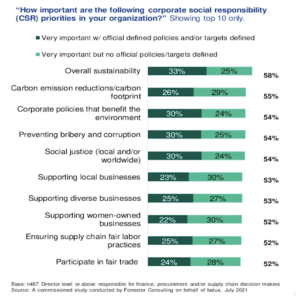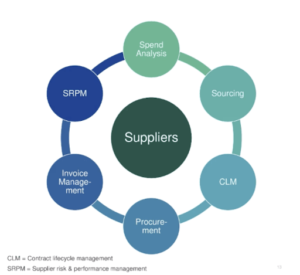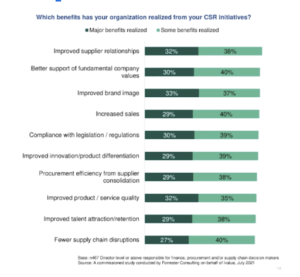Ivalua Named A Leader In The 2025 Gartner Magic Quadrant™ For Source-To-Pay Suites Report
View Report
Ivalua Named A Leader In The 2025 Gartner Magic Quadrant™ For Source-To-Pay Suites Report
View Report
Blog »

di Vishal Patel
In light of global trends and issues such as climate change and the Covid-19 pandemic, organizations are under increasing pressure to be socially responsible. More than ever, customers are looking to associate themselves with brands whose values align with social responsibility, sustainability, and social justice issues.
New legislation and regulations that support these imperatives are adding to the urgency for businesses to adopt and execute on corporate social responsibility (CSR) initiatives — but there are barriers to overcome, especially in Procurement.
While many organizations have taken initial steps towards CSR, only a few have made meaningful progress. During a recent webinar, Forrester’s Principal Analyst Duncan Jones and Ivalua’s CMO Alex Saric discussed research findings from Forrester’s recent study, “How Procurement can Accelerate Corporate Social Responsibility Performance,” and how leading brands are using sustainability as a market differentiator.
This blog post shares key takeaways from the webinar, including research findings and a checklist you can follow to help you to leverage CSR to drive revenue, while making a positive impact for society.
According to Jones, although the pressing issue of climate change has been a primary driver of CSR, it’s not the only priority. “We found a number of other drivers,” he said. “However, only about half of the people who thought these drivers were important are actually doing something real about them in terms of implementing official policies and targets.”
Among CSR initiatives, overall sustainability topped the list of priorities. Fifty-five percent prioritize carbon emission reductions. Other key initiatives included corporate policies that benefit the environment, preventing bribery and corruption, and social justice (see Figure 1).

Figure 1. Top CSR initiatives among Forrester survey respondents.
According to the survey, CPOs use several methods to improve CSR performance, including increasing participation in local initiatives (45%), auditing suppliers (40%), building CSR into the corporate brand and strategy (37%) and redesigning products to meet CSR requirements (36%). But Jones said that Ensuring CSR initiatives are successful comes down to building the CSR agenda more centrally into a company’s brand image, key messages, and corporate strategy.
Take, for example, Boohoo, a major retailer in the U.K. After receiving bad publicity about its Leicester factories, it learned that a failure to effectively monitor the supply chain had led to endemic issues of poor working conditions, insufficient pay levels, and neglected employees rights. To fix the problem, Boohoo increased CSR transparency and ended contracts with 64 non-compliant suppliers. It also banned suppliers from sub-contracting and built a model factory in the community which employs local workers and provides better working conditions, setting a best-practice example.
Jones said that Boohoo’s changes are working but haven’t totally solved the problem yet. “This isn’t an easy issue to address,” he said. “If you have problems that have been in place for a long time, it’s going to take a while and concerted action to change.” Jones added that an inability to audit and monitor suppliers is a major obstacle to improving CSR performance.
So how can you remove these obstacles? Forrester found that the most successful CSR initiatives come from the top down. The survey revealed that among CSR leaders, executive vision to make a positive impact on society was the key driver, followed closely by the need to comply with regulations and legislation. Encouraging a positive public perception of the brand came in third, followed by improving products and services, and meeting employee expectations.
“Many companies are ‘greenwashing,’ where they come up with marketing campaigns to pretend they’ve got a solid CSR agenda, but they’re not really fixing the fundamental problems,” Jones said. In other words, if the brand image is all that they are worried about, they’re probably not investing into CSR and not committed to making a positive impact on society.
“When executive commitment is conveyed to suppliers, it makes it clear to them that this is no longer a ‘don’t ask, don’t tell’ approach,” said Jones, adding that the foundation for improving CSR performance is to have good software driving sourcing, procurement, and supplier measurement — what Forrester calls Supplier Value Management (SVM).
SVM consists of a portfolio of applications that cover the entire Source-to-Pay process (see Figure 2).

Figure 2. Many applications make up an effective Supplier Value Management platform, helping to streamline collaboration with suppliers to improve their participation in CSR initiatives.
CSR leaders are benefitting from such software by empowering suppliers with flexibility, automation, and reporting capabilities. About 24%of respondents reported major CRS performance improvements when they:
CSR initiatives have far-reaching benefits, beyond the positive impact they have on society. Survey respondents reported a wide range of improvements, including better supplier relationships, improved brand image, and increased sales (see Figure 3).

Figure 3. The benefits of implementing CSR initiatives are numerous and can lead to smoother operations and improved revenue and margins.
Given these benefits, CSR is not just a goal; it’s an imperative. But improving CSR performance is impossible without technology that enables you to capture CSR scores and build those scores more transparently into sourcing decisions the.
If you’ve been struggling to garner support for greater investment in SVM technology or resources to help you transform how your organization sources the products and services it needs, here are some recommendations from Forrester:
The full on-demand recording of the webinar can be found here. Meanwhile, to help you get started with putting your CSR initiatives into motion, below is a short checklist we put together, taking Forrester’s findings into consideration.
Learn more about Ivalua’s complete Source-to-Pay platform, and how you can use it to boost CSR performance in your organization.

Vishal has spent the last 15 years in various roles within the Procurement and Supply Chain technology market. As an industry analyst, he researched and advised organizations in various industries on best and innovative practices, digitization and optimization. He brings a thorough understanding of market trends and digital technologies that can help enterprises be more effective with their Procurement and Supply Chain strategies. He works to ensure that organizations are empowered with technology platforms that enable flexibility, innovation, and agility.
You can connect with Vishal on Linkedin